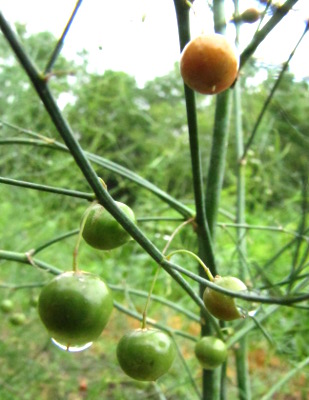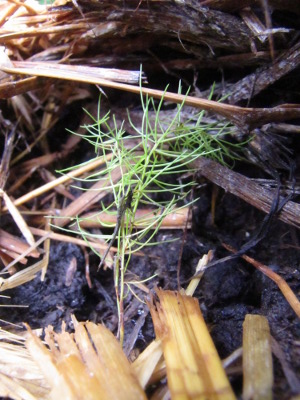
Conventional asparagus vs. all-male hybrids
 Which is better, conventional
asparagus or all-male hybrids?
Which is better, conventional
asparagus or all-male hybrids?
First of all, you have
to understand the difference. Most plants have both male and
female flowers, but each asparagus plant is either entirely male or
entirely female, just like a person or a chicken. The female
plants are easy to see in late summer since they produce berries that
turn bright orange as they ripen.
If you grow conventional
asparagus, about half of your plants will be females and half will be
male. The female plants have to spend a lot of energy making
fruits every year, so they tend to have fewer and smaller spears ---
extension service websites say that females produce as little as a
third of the food that male plants do. That's why nurseries have
developed all-male hybrids --- strains in which nearly all of the
plants will be male.
The problem with
all-male hybrids is the same as the problem with hybrid seeds of other
garden vegetables --- you're no longer self-sufficient. I decided
I wanted to expand my  asparagus planting this year,
so I just dug up nine tiny plants that had self-seeded below our
conventional asparagus plants and set the seedlings out in their new
home. If I wanted to get a friend started with asparagus, it
would also be as simple as mailing him or her an envelope full of seeds.
asparagus planting this year,
so I just dug up nine tiny plants that had self-seeded below our
conventional asparagus plants and set the seedlings out in their new
home. If I wanted to get a friend started with asparagus, it
would also be as simple as mailing him or her an envelope full of seeds.
Whether the lower yield
of conventional asparagus is worth the ability to easily propagate your
own plants will probably depend on your space constraints. If I
had less elbow room but wanted to stay self-sufficient, I might plant a
conventional variety, then rip out nearly all of the female plants once
I could identify them. I would keep one female to seed new
asparagus plants, still enjoying the high yields of the mostly male
planting. As it is, though, I'm too lazy to be that high tech,
and am just enjoying the complex mix of all-male and conventional
plants that my garden acquired over the years.
Want more in-depth information? Browse through our books.
Or explore more posts by date or by subject.
About us: Anna Hess and Mark Hamilton spent over a decade living self-sufficiently in the mountains of Virginia before moving north to start over from scratch in the foothills of Ohio. They've experimented with permaculture, no-till gardening, trailersteading, home-based microbusinesses and much more, writing about their adventures in both blogs and books.
Want to be notified when new comments are posted on this page? Click on the RSS button after you add a comment to subscribe to the comment feed, or simply check the box beside "email replies to me" while writing your comment.

Brian --- I don't know this for sure, but I think that all of the "all-male" varieties actually have a small percentage of female plants, which is how they propagate them. You might be sitting on a mini gold mine --- if that female produces nearly all males, I'll bet folks would pay a lot for the seeds.
Rebecca --- it's a good idea, but the way asparagus blooms, there are tiny blooms all over every frond. I'd either have to take an hour picking off blooms (no way!) or cut the whole frond down, in which case the plant would just send up a new one with more flowers.